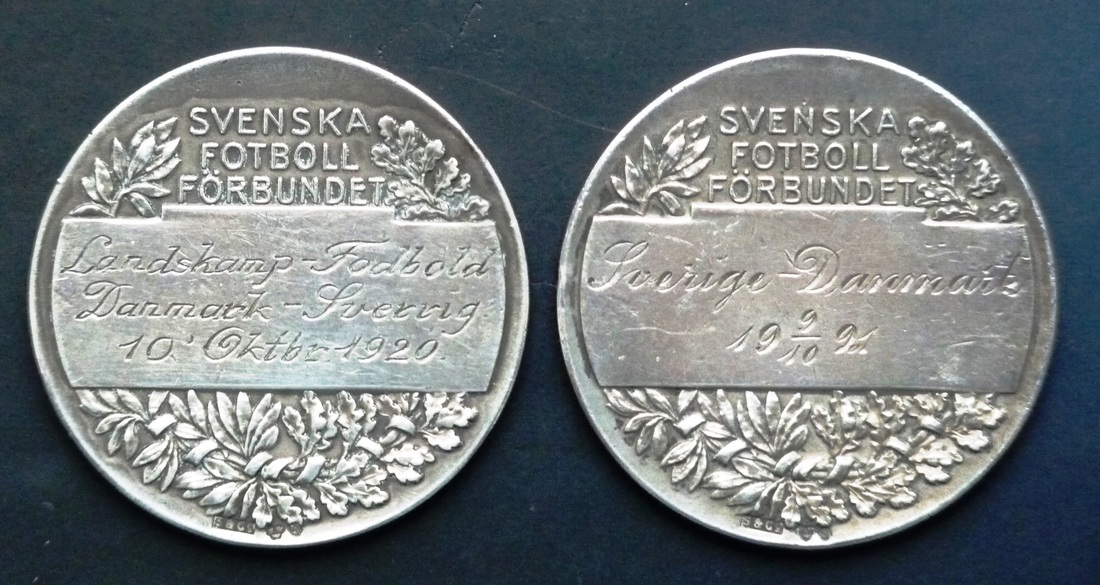By chance I have in my collection a couple of attractive souvenirs of two early encounters between the nations. These silver medals were presented by the Swedish FA to the players (caps never really took off outside the UK) and they have been engraved with the match details.
The two games were both at the old Rasunda Stadium in Solna (now replaced by the Friends Arena) and were played on 10 October 1920, then a year later on 9 October 1921. Denmark won the first 2-0 and drew the second 0-0, and I'm sure they would be delighted with similar outcomes on Saturday night.
The medals appear to have belonged to a Danish player as the 1920 engraving uses the term 'fodbold' rather than Swedish 'fotboll'. Also - one for the etymologists - it describes Denmark's opposition as 'Sverrig', an archaic word that was replaced in the Danish language by 'Sverige' early in the 20th century. Four Danish players featured in both matches, so it could have belonged originally to any one of Leo Dannin, Ernst Nilsson, Steen Blicher or Poul Nielson.
Of course, I could not write a blog without a Scottish reference, and one of the pioneers of Danish football was a man from Dundee.
When Queen's Park went on tour to Copenhagen in 1898, Scottish Sport magazine carried an interview with former player Alexander Hamilton, in which he stated that the honour of introducing the game in Denmark belonged to a former Dundee Strathmore player called JT Smart. (See Matt McDowell's fascinating article for full details).
With a bit of investigation, I have uncovered a few details about Smart, which indicate that although he was an important figure he was likely not the actual founder of the game in Denmark.
The first thing is that the Scottish Sport article gets his middle initial wrong. He was James Young Smart, born in Dundee on 18 March 1862, the son of a jute mill manager. Strathmore FC was founded early in 1877, named in honour of its patron the Earl of Strathmore, and played its first match in March against Dunmore. Its ground was at Rollo's Pier, off Magdalen Yard Road at the west end of the city.
James Young Smart was elected secretary and treasurer of Strathmore in the summer of 1878, aged just 16, and played regularly for the club over the next few years, rising to become club president in 1882. He held that role until he left Dundee, as reported in the Evening Telegraph on 18 February 1885: 'On Monday evening a number of gentlemen met in the Queen's Hotel and entertained Mr J.Y. Smart to supper on the occasion of his leaving Dundee for Copenhagen.'
Clearly Smart continued to play football as he was the top scorer in Denmark’s first league tournament in 1889-90, with 12 goals for KB who finished second behind Akademisk.
He returned to Dundee, probably when his father died in 1896, to join the family business at Rosebank jute mill, and is listed as a member of Dundee FC's match committee in December 1898, when the club got going again after liquidation. In December 1899 his sisters ran a stall at the football club bazaar.
Thereafter, things get hazy. Although listed as a jute factory manager in the 1901 census, by 1907 he was no longer involved in the business.
It appears his life went into a downward spiral as Smart died at Duke Street Hospital, Glasgow on 8 May 1921, age 59 and unmarried. The death certificate gave his usual residence as the Great Eastern Hotel, politely known as a ‘working man’s hostel’ but in reality a doss-house; cause of death was myocardial degeneration and chronic nervous congestion (ie heart disease and stroke). A sorry end for Scottish football pioneer.

 RSS Feed
RSS Feed